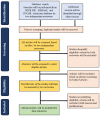The Impact of Introducing Midwives and also Mentoring on the Quality of Sexual, Reproductive, Maternal, Newborn, and Adolescent Health Services in Low- and Middle-Income Countries: An Integrative Review Protocol
- PMID: 37218908
- PMCID: PMC10204447
- DOI: 10.3390/mps6030048
The Impact of Introducing Midwives and also Mentoring on the Quality of Sexual, Reproductive, Maternal, Newborn, and Adolescent Health Services in Low- and Middle-Income Countries: An Integrative Review Protocol
Abstract
Introduction: Midwives have the potential to significantly contribute to health-delivery systems by providing sexual, reproductive, maternal, newborn, and adolescent health (SRMNAH) care. However, scant research finds barriers to understanding what midwives need to realize their full potential. There are gaps in the definition of a midwife and an understanding of effective means to support the implementation of midwifery care. Mentorship has been found to support systems and healthcare providers to improve care availability and quality.
Objectives: We describe the methodology of an integrative review that aims to generate evidence of the impact of introducing midwives and also on-site facility mentoring to better understand facilitators and barriers to implementation of the quality and availability of SRMNAH services in low- and middle-income countries (LMICs).
Methods: The Preferred Reporting Items for Systematic Reviews and Meta-Analyses (PRISMA) guidelines will be used to carry out the integrative review. Four electronic bibliographic databases, PubMed MEDLINE, EMBASE, Scopus, and CINAHL, will be used to identify eligible studies. All types of qualitative or quantitative studies will be considered. Eligible studies will be screened according to Population, Intervention, Comparison, and Outcome (PICO) inclusion criteria, and data will be extracted against a predetermined format. The aspects of health system strengthening in providing improved SRMNCH care will be examined in this review to generate evidence on how midwives and mentorship can improve routine care and health outcomes using the World Health Organization's Six Building Blocks approach. The quality of the articles will be thematically analyzed in four areas: coherence and integrity, appropriateness for answering the question, relevance and focus, and overall assessment using the Gough weight-of-evidence framework.
Expected results: The literature review will consider assessing both upstream health systems regulators and downstream effectors for implementing midwifery interventions. Within this building block framework, this research will report on the outcomes and experiences of introducing midwives and the effectiveness of mentoring midwives and other staff in midwives' roles in improving care quality and health outcomes.
Keywords: health systems strengthening; maternity care; mentoring; midwives; quality.
Conflict of interest statement
The authors declare no conflict of interest.
Figures
Similar articles
-
Strengthening quality in sexual, reproductive, maternal, and newborn health systems in low- and middle-income countries through midwives and facility mentoring: an integrative review.BMC Pregnancy Childbirth. 2023 Oct 5;23(1):712. doi: 10.1186/s12884-023-06027-0. BMC Pregnancy Childbirth. 2023. PMID: 37798690 Free PMC article. Review.
-
Beyond the black stump: rapid reviews of health research issues affecting regional, rural and remote Australia.Med J Aust. 2020 Dec;213 Suppl 11:S3-S32.e1. doi: 10.5694/mja2.50881. Med J Aust. 2020. PMID: 33314144
-
Improving the Quality of Maternity Care through the Introduction of Professional Midwives and Mentoring in Selected Sub-District Hospitals in Bangladesh: A Mixed Method Study Protocol.Methods Protoc. 2022 Oct 21;5(5):84. doi: 10.3390/mps5050084. Methods Protoc. 2022. PMID: 36287056 Free PMC article.
-
The impact of professional midwives and mentoring on the quality and availability of maternity care in government sub-district hospitals in Bangladesh: a mixed-methods observational study.BMC Pregnancy Childbirth. 2022 Nov 8;22(1):827. doi: 10.1186/s12884-022-05096-x. BMC Pregnancy Childbirth. 2022. PMID: 36348362 Free PMC article.
-
What are the benefits and challenges of mentoring in midwifery? An integrative review.Womens Health (Lond). 2022 Jan-Dec;18:17455057221110141. doi: 10.1177/17455057221110141. Womens Health (Lond). 2022. PMID: 35801517 Free PMC article. Review.
Cited by
-
Strengthening quality in sexual, reproductive, maternal, and newborn health systems in low- and middle-income countries through midwives and facility mentoring: an integrative review.BMC Pregnancy Childbirth. 2023 Oct 5;23(1):712. doi: 10.1186/s12884-023-06027-0. BMC Pregnancy Childbirth. 2023. PMID: 37798690 Free PMC article. Review.
-
Midwives: Essential guardians in the climate crisis journey.Eur J Midwifery. 2024 May 22;8. doi: 10.18332/ejm/188196. eCollection 2024. Eur J Midwifery. 2024. PMID: 38779537 Free PMC article. No abstract available.
-
Interdisciplinary fetal-neonatal neurology training improves brain health across the lifespan.Front Neurol. 2024 Jul 4;15:1411987. doi: 10.3389/fneur.2024.1411987. eCollection 2024. Front Neurol. 2024. PMID: 39026582 Free PMC article. Review.
References
-
- Nove A., Friberg I.K., de Bernis L., McConville F., Moran A.C., Najjemba M., ten Hoope-Bender P., Tracy S., Homer C.S. Potential impact of midwives in preventing and reducing maternal and neonatal mortality and stillbirths: A Lives Saved Tool modelling study. Lancet Glob. Health. 2021;9:e24–e32. doi: 10.1016/S2214-109X(20)30397-1. - DOI - PMC - PubMed
-
- Renfrew M.J., McFadden A., Bastos M.H., Campbell J., Channon A.A., Cheung N.F., Silva D.R.A.D., Downe S., Kennedy H.P., Malata A., et al. Midwifery and quality care: Findings from a new evidence-informed framework for maternal and newborn care. Lancet. 2014;384:1129–1145. doi: 10.1016/S0140-6736(14)60789-3. - DOI - PubMed
LinkOut - more resources
Full Text Sources


